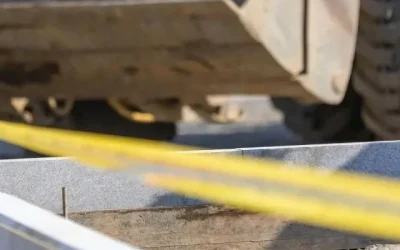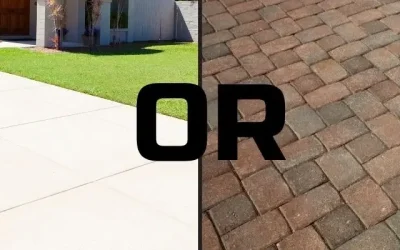When it comes to choosing a driveway for your home, two of the most popular materials are concrete and asphalt. Both have their advantages, but they serve different needs depending on your budget, aesthetic preferences. Whether you’re building a new home or upgrading your existing driveway, the decision can feel overwhelming. In this post, we’ll break down the key differences between concrete and asphalt driveways to help you decide which one is right for you.
Concrete Driveway
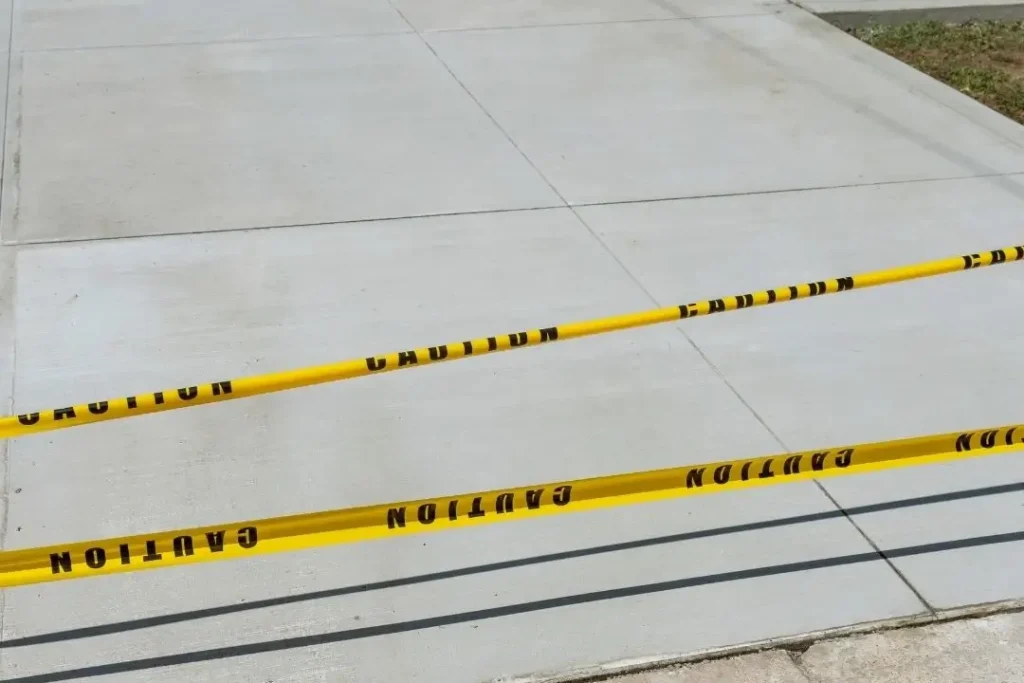
Concrete driveways are made by mixing cement with water, sand, and gravel to create a solid surface that hardens over time. Once poured and cured, concrete becomes a strong and long-lasting option for residential driveways. It’s a popular choice for homeowners who want a modern, low-maintenance finish that holds up well under regular use.
One of the biggest advantages of concrete is its versatility. You can keep things simple with a classic plain slab or customise the surface with colour, exposed aggregate, or decorative stamping for added curb appeal. It works well in most climates, especially in warmer regions like South East Queensland, and with proper sealing, it resists weathering, staining, and wear. For homeowners looking to boost the visual appeal of their property while keeping maintenance to a minimum, concrete is a solid investment.
Asphalt Driveway
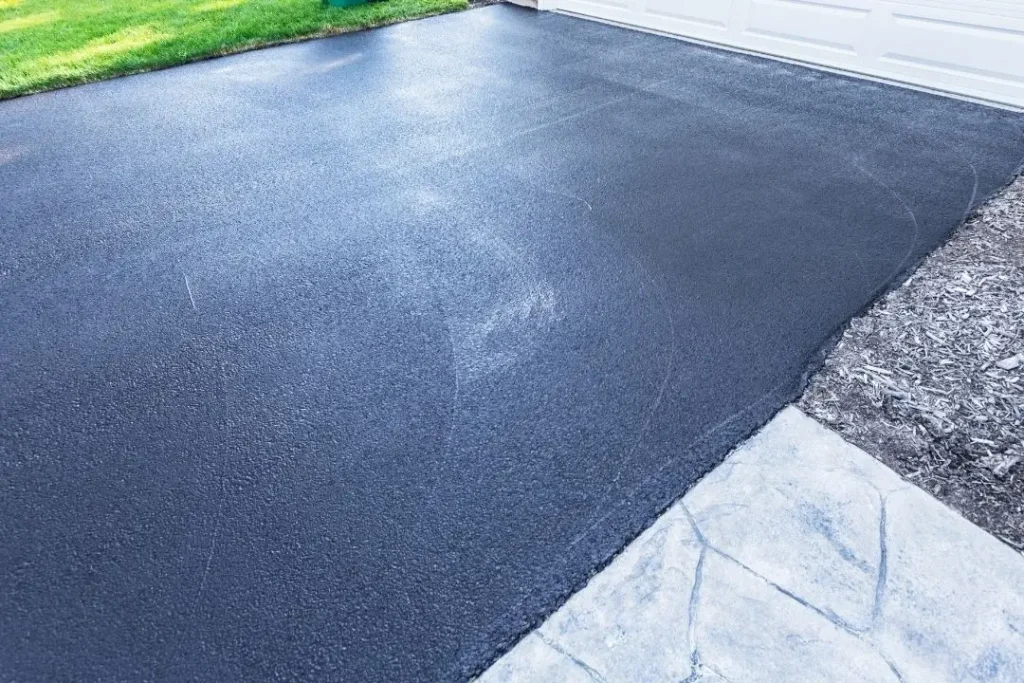
Asphalt is made from a blend of bitumen, sand, and aggregates, heated and applied over a prepared base. Once laid, the surface cools and hardens into a dark, uniform finish that’s smooth to drive on and able to withstand the elements.
Asphalt is commonly used in residential, commercial, and rural settings, particularly for long driveways or areas where quick installation is important. It’s valued for flexibility and resiliency, especially in climates with fluctuating temperatures. While it doesn’t offer the same custom finishes as concrete, it provides a clean, streamlined look that blends well with most surroundings.
Key Comparisons Between Concrete and Asphalt Driveways
When weighing up driveway options, a side-by-side comparison can help make the choice clearer. Concrete and asphalt each have their strengths, but they perform differently across several key factors.
Cost
Concrete driveways usually come with a higher upfront cost due to both the material and labour involved. It’s a more expensive option per square metre, but one that many homeowners see as a long-term investment, especially for smaller or high-end driveways.
Asphalt is more affordable to install and often chosen for larger driveways or when working within a tighter budget. The quicker installation also helps keep labour costs down, making it a more cost-effective option from the outset.
Durability
Concrete driveways can last more than 30 years when installed correctly and maintained over time. It offers strong structural stability, making it well-suited for regular vehicle traffic. While durable, concrete can develop cracks if the ground shifts, erosion degrades the subbase, or if tree roots push underneath the slab.
Asphalt driveways usually have a shorter lifespan, typically around 15 to 20 years in residential areas. However, asphalt is more flexible than concrete, which helps it handle minor ground movement or pressure from roots without cracking as easily. Over time, though, the surface can wear down and may need resurfacing.
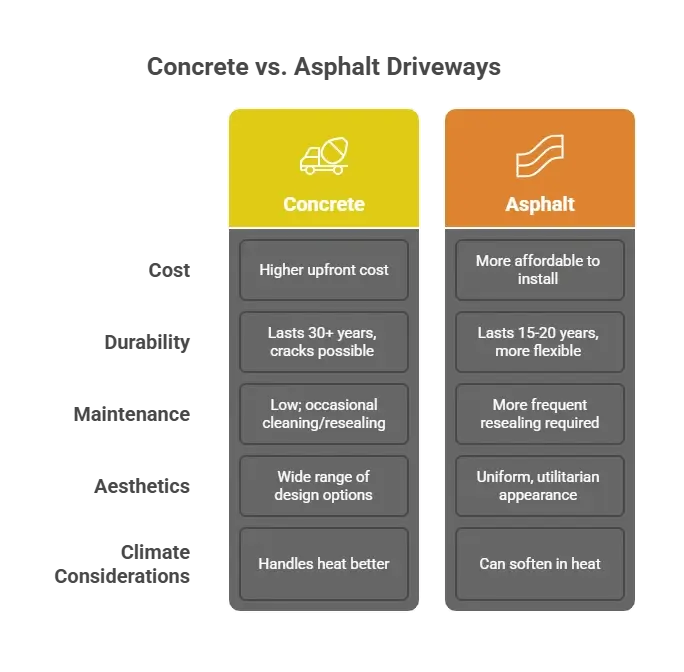
Maintenance
Concrete driveways are relatively low-maintenance. Once installed, they benefit from occasional cleaning and resealing to protect against surface stains and wear. For a quick overview of how sealing works, check out this simple concrete sealing guide from Bunnings. If cracks appear, repair can be more noticeable, and in some cases, sections may need resurfacing or a full replacement.
Asphalt driveways require more frequent upkeep. They should be resealed every few years to maintain their condition and prevent softening in the heat. However, minor repairs like filling cracks or potholes are generally quicker and less costly than concrete fixes.
Aesthetics
Concrete offers a wide range of design options, making it ideal for homeowners who want to customise the look of their driveway. You can opt for plain, polished concrete or choose coloured, stamped, or exposed aggregate finishes for a more decorative touch. This versatility suits a variety of home styles, from modern to traditional. If you’re weighing up the differences between regular concrete and exposed aggregate, this comparison guide breaks down the pros and cons to help you choose the right style for your space.
On the other hand, asphalt has a more uniform and utilitarian appearance. While it’s typically black, it can be tinted or textured, though options are limited compared to concrete. It’s a solid look, but it doesn’t provide the same visual impact or flexibility in design.
Climate Considerations
Concrete and asphalt each respond differently to Queensland’s warm, sometimes unpredictable weather. Concrete tends to handle heat better, maintaining its structure and finish even during hot summers. It’s a strong choice for Caboolture and surrounding areas where high temperatures and sun exposure are common.
Asphalt can become soft or sticky on very hot days, especially under the weight of parked vehicles or trailers. This can lead to minor surface marks or quicker wear over time. Though with regular maintenance, asphalt can still perform well in Queensland’s climate.
Which is Better for Your Home?
If you’re after a clean, long-lasting finish that adds real street appeal, concrete is a strong contender. It suits smaller driveways where details like colour, texture, and shape can make a big visual impact. From smooth broom finishes to decorative stamped or coloured options, concrete lets you customise the look to match your home. It also holds up well under regular vehicle use and, with proper care, can last for decades without much fuss.
However, if you’re working on a tight budget or paving a long driveway on a large property, asphalt is a practical and economical choice. Its lower upfront cost and faster installation make it ideal for larger properties with long access roads and frequent vehicle use. While it may not have the same visual impact as concrete, asphalt is functional, reliable, and easy to maintain with regular care.

Conclusion
When it comes to choosing between concrete and asphalt for your driveway, there’s no one-size-fits-all answer. Each material has its own strengths, and the best option will depend on your budget, design preferences, and how you plan to use the space. Concrete offers long-term durability, visual appeal, and low maintenance, great for homeowners wanting a premium, lasting finish. Asphalt, on the other hand, is a cost-effective, fast-install solution that works well for larger or more functional driveways.
If you decide that concrete is the way to go for your driveway in Caboolture, Bellmere, or nearby Moreton Bay suburbs, we’d be happy to help. We deliver reliable concrete driveway installations for your property. Reach out today by calling us on (07) 5408 6099 to get a free quote.


